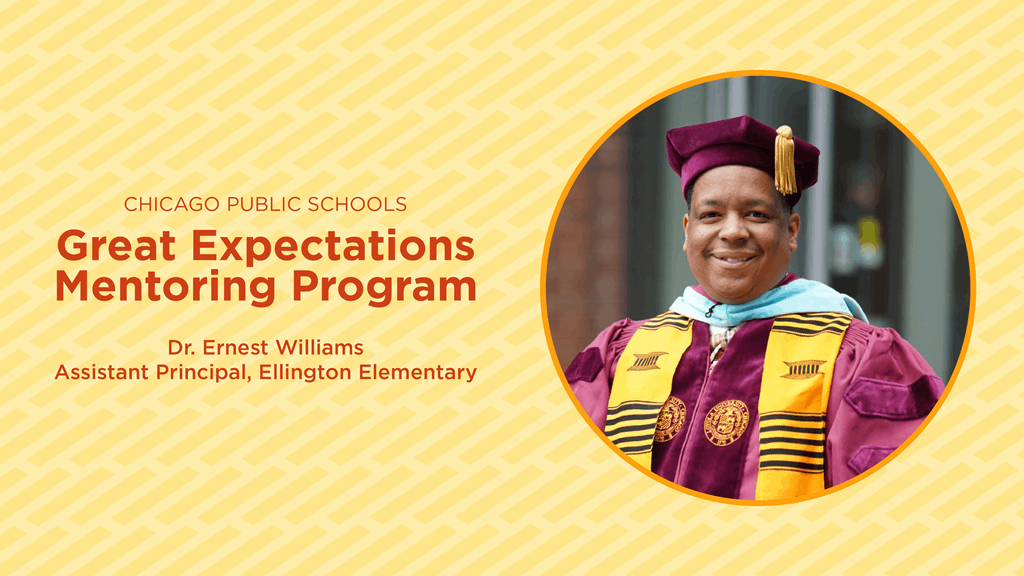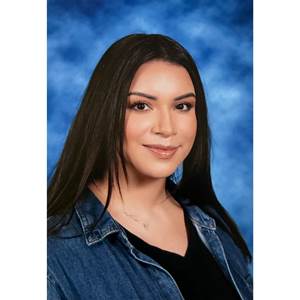Getting Serious About Closing Opportunity Gaps for Black Males
12 November 2020
By Dr. Ernest Williams, Assistant Principal at Ellington Elementary

Would you believe it if I told you that the man in the picture above—who earned his doctorate last year—was a failing student in elementary school?
I am a graduate of Chicago Public Schools. High school was where I underwent a transformation. I will never forget my sophomore year English teacher, broken ankle and all, telling me: “Ernest, I need you to teach my class.”
I would stay up late with her to make sure I knew each of the readings well enough to help the substitute run the classroom. On top of that, I was a peer tutor and took part in a medical program at Chicago State University and a computer science program at Loyola University Chicago.
The experiences we have in school matter. Traveling from 87th Street to Rogers Park every morning to learn about computers impacted my entire life trajectory. Fast forward seven or eight years to my first job in the district. I taught computer science.
I like to think of my story as what has inspired me to be a data-driven and transformative leader—both in big and small ways.
In one of my first positions with CPS during the early 2000s, I quickly noticed that a lot of the Black male students were being suspended. Other staff members would make negative comments about them as well. So, I developed a brotherhood program to give these students a space to connect with each other.
More recently, I had the opportunity to leave the district for a few years to help schools across the country improve student outcomes. For a full year, this work brought me to Gary, Indiana, to lead a turnaround high school that had never received a passing grade on the state’s School Report Card.
Helping this school rise to the highest possible rating in one year was the result of answering tough questions through the lenses of equity and restorative practices. Why is the suspension rate five times that of the state? Why are our most vulnerable students only taking computerized classes? Why do we have bell schedules that are working against high attendance rates?
Equity-informed solutions drive growth—and you also need leaders who will relate to the unique backgrounds and challenges of the populations that they serve. I will always be a lover of research. I keep close tabs on how cities like Oakland and Seattle are supporting their Black students. But replication is not enough. Solutions need a “homegrown” perspective to be effective.
Seeing Dr. Janice Jackson, a fellow CPS graduate, take the reins of the district is what inspired me to return and join the Ellington school community.
I have big plans for my school, specifically our Black male students. The catalyst for this work was the district’s phenomenal Great Expectations Mentoring (GEM) program. Through this program, I was able to collaborate with like minded district leaders—including many CPS graduates—who are also striving to ensure that students receive a world-class education.
Embedding the CPS Equity Framework into all of our discussions helped us realize how united we are as Black and Latinx leaders when developing solutions to the issues that concern us. It felt like an extension of my doctoral work. I graduated from the program a few weeks ago and will be implementing some of my ideas at Ellington by the end of this month.
Each participant in the program was required to complete a capstone project on a relevant issue, and I chose supporting Black male students through culturally relevant enrichments and strategic interventions.
While these are data-informed approaches, I believe that you have to know the stories behind the data before you make any decisions. That’s why I held a series of focus groups with students to gain a deeper understanding of their needs.
I envision an entire suite of supports at Ellington—from SEL-centered intervention groups to small group mentoring to virtual leadership development clubs to service-learning projects. It is my hope that, even as we teach remotely, my school can start to become a model on the West Side in terms of social-emotional learning and college and career readiness.
Eventually, I would love to see the district assemble an entire team of individuals who are solely focused on helping our Black males succeed. The foundation is already being built with programs like Teach Chicago Tomorrow that will help more of our students give back to the district as teachers—just like I did.
It’s empowering to think about what we can accomplish as a district, but it’s also important to remember that all systemic change starts with the individual. Liberatory thinking is key. We need to remind ourselves that, until we start actively working to develop solutions, we are contributors to the problems that persist.
Therefore, being inspired by my own journey as a CPS student, I will be working to transform the academic experiences of my students at Ellington Elementary. Would you believe it if I told you that you could be a changemaker, too?
Dr. Ernest Williams is the assistant principal at Ellington Elementary in Chicago’s Austin neighborhood. He has served CPS students since 2002 and holds a doctoral degree in educational leadership from Loyola University Chicago.
Related Stories
10 December 2025
Take Five with Jennifer Marrero, Teacher of the Visually Impaired at Otis Elementary
Ms. Marrero's favorite part of her work is the relationships she builds with her students and their families.
05 December 2025
Take Five with Dania Daoud, Restorative Justice Coordinator at Parker Community Academy
Mrs. Daoud is known to be patient and understanding, and someone who her school community could lean on.
04 December 2025
A Peek at One Teacher’s Journey Over the Last Five Years
Ms. Bautista is starting to be a mentor for newer teachers.
21 November 2025
A Great Start to the School Year in Ms. Dela Cruz’s Classroom
This year is shaping up to be one of Ms. Dela Cruz's best years yet.




